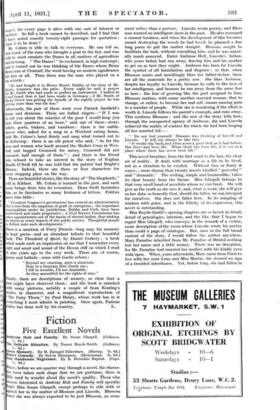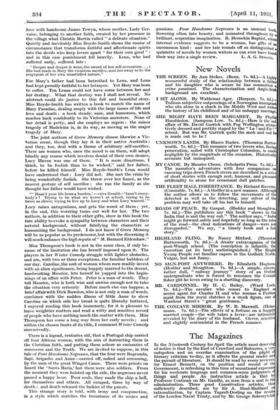Fiction
Five Excellent Novels
brose Holt and Family. By Susan Glaspell. (Gollancz. 7s. M.) e Delicate Siivation. By Naomi Royde-Smith. (Gollancz. 7s. M.) HEN, before we are quarter way through a novel, the charac- rs have taken such shape that we are partisans, there is le need to wonder about the novel's 'quality. Those who rue interested in Ambrose Holt and Family will speedily rget Miss Susan Glaspell, except perhaps to side with or inst her in the matter of Blossom and Lincoln. Blossom and she was always expected to be just Blossom, an orna-
ment rather than a partner. Lincoln wrote poetry, and Blos- som wanted an intelligent share in the poet. He also managed a cement business, and when the development of this business meant destroying the woods he had loved, he planned a fine long poem to put the matter straight. Blossom sought to facilitate the task, without consulting him, and he was natur- ally much annoyed. Enter Ambrose Holt, Lincoln's father, who years before had run away, leaving him and his mother to get on as best they might. Ambrose has been for Lincoln the symbol of all humiliation and disgrace : so that, when Blossom meets and unwillingly likes her father-in-law, there are all the materials for a pretty row. She likes Ambrose, despite her loyalty to Lincoln, because he calls to the best of her intelligence, and because he ran away from the same fear as hers : the fear of growing like the part assigned to him. Blossom realizes, with many another married woman, that to change, or rather, to become her real self, means causing pain to a number of people. While she is wondering if the effort is worth it, Lincoln follows his parent's example, and runs away. This confirms Blossom : and the rest of the story tells how, through the unexpected agency of Ambrose, she and Lincoln achieved the reality of contact for which she had been longing all her married life :-
" Do not fool yourself,' Blossom was thinking of herself and Lincoln. ' It will not always be like this.' It would slip back, and often saem a good deal as it had before. But there had been life. When theie has been life, it is rot as a place where there has never been life."
This novel breathes, from the first word to the last, the clear air of reality. It deals with marriage as a life to be lived, not as a situation to be evaded. Without fuss or flurry it convey :3 more drama than twenty novels labelled " powerful " and " dramatic." The writing, simple and businesslike, takes its clear beauty from the theme. Miss Glaspell belongs to that very small band of novelists whom we can trust. She will give us the truth as she sees it, and, what is more, she will give us het data so honestly that, should she falter, we can interpret for ourselves. She does not falter here. In its mingling of wisdom with grace, and in the felicity of its expression, this
novel is outstanding.
Miss Royde-Smith's opening chapters are so lavish in detail,
detail of genealogies, interiors, and the like, that I began to regret Miss Glaspell, who conveys, in the remark of a visitor, more description of the room where Lincoln wrote his poetry than could a page of catalogue. But, once in the full broad current of the story, I would follow the author anywhere. Mary Paradise inherited from Mr. Paradise of Bristol nothing but her name and a little money: There was no deception, for Mr. Paradise had married her mother with his kindly eyes wide open. When, years afterwards, Mary came from Paris to live with her aunt Lena and Miss Martin, she showed no sign of a troubled inheritance. Yet, before long, she had fallen in Jove with handsome James Towyn, whose mother, Lady Ger- • vaise, belonging to another faith, created by her presence in the village what Christie Martin called " a delicate situation." Quietly and inevitably Miss Royde-Smith shows the course of ,circumstance that transforms faithful and affectionate spirits into the devils who keep lovers apart " for their own good " : and in this case punishment fell heavily. Lena, who had suffered early, suffered late :
• "Deeper and deeper it went, the sword of her self-accusation. . . ; She had made in Mary the vicarious sacrifice, sent her away to be the scapegoat of her own unsatisfied nature."
For Mary's father had been betrothed to Lena, and Lena had kept proudly faithful to her betrayer. Yet Mary was born to suffer. Ten Lenas could not have come between her and her destiny. What that destiny was I shall not reveal. No abstract could do justice to this full and beautiful story. Miss Royde-Smith has written a book to match the name of Mary Paradise, dealing amply with the large issues of life and love and death : a book steady, sane, and humorous, which reaches back confidently to its Victorian ancestors. None of her detail is petty, and she employs no supers : the minor tragedy of Madeleine is, in its way, as moving as the major tragedy of Mary.
The joint authors of Green Memory choose likewise a Vic- torian scene, though they lay it in their native Australia : and they, too, deal with a theme of arbitrary self-sacrifice. There are women who, once the mood is on them, will adopt blindly any course which involves denial of their own desires, Lucy Haven was one of them. " It is more disastrous, I think, to be foolish than to be wicked," said her father, before he killed himself. Miss Royde-Smith's Lena would have understood that : Lucy did not. She met the crisis by being wonderfully foolish. She threw over her fiance, as the nearest gesture of self sacrifice : she ran the family as she thought her father would have wished.
" Hasn't your life been a burden,' —cries Gerald—' hasn't every- body's ? Trying to be what we weren't at school, trying to be twice as clever, trying to live up to Lucy and what Lucy wanted.' " Lucy raises antagonisms, and gets the worst of them : yet, in the end, this worsting turns out well for her. The two authors, in addition to their other gifts, show in this book the hire ability to evoke a sympathy between characters and their natural background, without falsifying the characters or humanizing the background. I do not know if Green Memory will be as popular as its predecessor, but with the discerning it Will much enhance the high repute of " M. Barnard Eldershaw."
Miss Thompson's book is not in the same class, if only be- cause of the limitation she has herself imposed upon it. The players in her Winter Comedy struggle with lighter obstacles, and are, with two or three exceptions, the familiar babblers of our day. Caroline,the sort of woman whom men readily invest with an alien significance, being happily married to the decent,
hardworking Maurice, lets herself be yapped into the begin- nings of an affair with Peter. Peter is a man of words. They tell Maurice, who is both wise and unwise enough not to take the situation very seriously Before much else can happen, a brief affair with Dick Rawdoni who is not only a man of words. combines with the sudden illness of little Anne to show Caroline on which side her bread is quite liberally buttered, I enjoyed reading this book immensely, for it is pleasant to leave weightier matters and read a witty and sensitive record
of people who have nothing much the matter with them. Miss Thompson has come a long way from her early novels ; and within the chosen limits of its title, I commend Winter Comedy Unreservedly.
There is a legend, centuries old, that a Portugal ship carried off four African women, with the aim of instructing them in the Christian faith, and putting them ashore as emissaries of commerce and the Truth. We are invited to suppose, in this tale of Four Handsome .Negresses, that the four were Regeunda, gapi, Arigacho and Azize—carried off, naked and screaming, by the men of the great Winged Canoe. There were priests on board the ' Santa Maria,' but there were also soldiers. From the moment they were hoisted up the side, the negresses never passed a happy hour. Poor souls, they made the ship a hell,
for themselves and others. All escaped, three by way of death : and death released the luckier of the priests.
This strange story is told, with irony and compunction, in a style which matches the luxuriance of its scenes and
-passions. Four Handsome Negresses is an unusual hook flowering often into beauty, and animated throughout by brilliant, serpentine imagination. R. Hernekin Baptist, who internal evidence suggests to be a woman, has gifts of uncommon kind : and her tale rounds off as distinguished quintette of novels by women writers as can over have fo their way into a single review. L. A. G. STRONG,











































 Previous page
Previous page